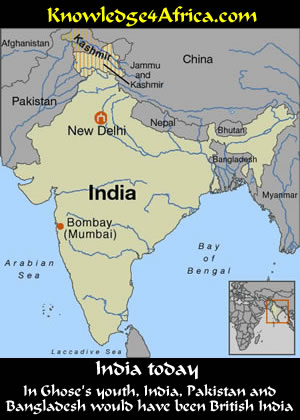|
READ THIS
The poet sees a beggar asleep on a street in Bombay. He notices how totally indifferent the passersby
are to this man's plight. Even he is indifferent. Indeed, he photographs the man and afterwards admires
how good a composition it was. Only later does his conscience stir in revulsion at his own action.
 NOTE ON THE POET
NOTE ON THE POET
Zulfikar Ghose was born in 1935 of Muslim parents at Sialkot, in what is today Pakistan but what was then
British India. Although he is claimed as the greatest of Pakistani poets, the fact that he has never actually
lived in Pakistan belies this belief.
Indeed, Ghose's writings cannot be confined to such a small box. He represents greater India, not just
a part of it. He is the natural inheritor of India's golden age before colonialism divided this great people
into unnatural factions.
When he was just seven years of age, Ghose's family left Sialkot for Bombay. Although now exiled from
his natural environment, the impressionable mind of the young poet would be forever imbued with pictures
of Punjabi society.

The poet was educated in a Catholic environment in Bombay, and started writing his poetry during these
years. At the age of 17, however, the family left the subcontinent to take up residence in London where
the teenager attended a Grammar School before finally graduating from Keele University.
Thereafter, although now a teacher, he continued to mix with British poets, and his poetic outpourings
were published in several British newspapers and journals. While in London, he met and married a
Brazilian artist, Helena de la Fontaine.
In 1969 Ghose and his wife again uprooted, this time to take up permanent residence in the United States
where he became a Professor of English at the University of Austin, Texas -- a position he holds to this
day.
Have you looked at the questions
in the right column?
|
TEST YOURSELF!
Read the left column and then answer
the following questions:
"I have a picture I took in Bombay
of a beggar asleep on the pavement:
grey-haired, wearing shorts and a dirty shirt,
his shadow thrown aside like a blanket."
- Is there any significance to the fact that the sleeping man is wearing shorts? (4)

[Need help?]
Possibly there is. The Victorians were great believers that as much of the body as possible had to be
covered. For men, this meant the wearing of trousers at all times to hide the legs. Shorts would only have
been worn by children.
The Victorian heritage has lived on in the colonies. Men today traditionally wear trousers. Shorts are worn
by children.
The fact, therefore, that the beggar is wearing shorts is indicative of his being an outcast from his own
society. He is dressed as a child. His poverty is therefore so great that his clothes are not only dirty but
also humiliating.
|
- Comment on the image "his shadow thrown aside like a blanket". (4)

[Need help?]
A shadow is an intricate part of a person. Should the shadow disappear, it would indicate that the being
has ceased to exist as a person.
In this poem, the beggar has reached such dire straits that even his shadow has been thrown aside, as
though it were a blanket. The shadow would appear to have been detached from the body, indicating
therefore that the beggar is seen no longer as a person.
|
"His arms and legs could be cracks in the stone
routes for the ants' journeys, the flies' descents.
Brain-washed by the sun into exhaustion,
he lies veined into stone, a fossil man."
- Why does the poet say that the beggar's arms and legs "could be cracks in the
stone"? (2)

[Need help?]
The poet is referring here to the extreme thinness of the beggar's body, arms and legs. They are so thin
that they could be mistaken for cracks in the stone pavement, or veins in the stone. Indeed, the man
himself looks as if he is made of stone, a fossil.
|
- In what way is the beggar lying "veined into stone". (2)

[Need help?]
Bear in mind that the poet is looking at the photograph he has taken. Back in the 1940s and even later,
black-and-white photography was in vogue. The man, his clothes, the stone pavement, would all have
been pictured in shades of grey. The man would therefore have toned in with the stone, being merely a
darker hue of grey -- looking therefore like a darker vein on the grey stone, or a dark crack in the
greyness of the pavement or sidewalk.
|
"His arms and legs could be cracks in the stone
routes for the ants' journeys, the flies' descents.
Brain-washed by the sun into exhaustion,
he lies veined into stone, a fossil man."
- Why would he be called "a fossil man"? (4)

[Need help?]
Indeed, the beggar, being grey in the photograph, would be the colour of stone and therefore could himself
have looked like a stone. On the other hand, "a fossil" is often used in a derogatory fashion to
describe an old, useless person.
|
- Comment on the word-usage in "Brain-washed by the sun into exhaustion". (4)

[Need help?]
This event happened during the hey-days of British India, before the dissolution of the British Empire.
There was a common expression at the time that the sun would never set on the Empire. Indeed, the sun
and Empire were almost synonymous.
Is the poet therefore pointing a desperate finger at the Sun of Empire? The sun has never set on this
man, and he has become a victim of the Empire itself. Days spent in the harsh sun has exhausted the
man, destroyed his brain. But he is also a victim of the brainwashing of the Empire which has relegated
him into the role of beggar, a role from which he can never escape.
|
"Behind him, there is a crowd passingly
bemused by a pavement trickster and quite
indifferent to this very common sight
of an old man asleep on the pavement."
- Comment on the indifference of the people. (4)

[Need help?]
The fact that the pavement trickster is more interesting than the nearby beggar is a sign of how society
has become numbed by the constant sight of poverty all around. The beggar is just one of many. Nothing
can be done to help him. The trickster, on the other hand, is of interest because it would appear that his
tricks can be seen through and that money can therefore be won from him.
Notice the implication that the bystanders are more ready to part with their money to the trickster than to
the beggar. And part with their money they will!
|
"I thought it then a good composition
and glibly called it The Man in the Street,
remarking how typical it was of
India that the man in the street lived there."
- Why does the poet use the term "glibly" (4)

[Need help?]
"Glib" means "insincere and shallow". At the time of taking the photograph, the
photographer believed he was creating a deeply philosophical work of art. Now, years later, he sees the
picture as insincere and shallow, exploiting the poverty and suffering of the beggar to enhance the
photographer's own prestige.
|
- Is there anything wrong with the title "The Man in the Street"? (4)

[Need help?]
The problem with the title "The Man in the Street" is that it is so impersonal. The beggar has been
stripped of his essence. He is just one beggar amongst many. His essence that makes him a unique
person has been cast aside, just as the man's shadow has been cast aside.
|
"His head in the posture of one weeping
into a pillow chides me now for my
presumption at attempting to compose
art out of his hunger and solitude."
- Why does the poet speak about his "presumption" at attempting "to compose art out of his
hunger and solitude"? (4)

[Need help?]
The photographer had initially believed himself as having made a deeply philosophical statement, having
produced a work of art. Now, looking again at the photograph, the poet sees that the beggar's posture
is that of one weeping into a pillow. The poet is struck by the pain that haunts the beggar, a pain which
he did not notice at the time of taking the picture.
The poet raises the all-important question: is it possible for there to be art in pain and suffering. Art by
its very nature is a glorification of the artist. The artist is always greater than the art. In this sense, then,
the artist is being glorified to the detriment of the beggar. The beggar, on the other hand, has been
exploited so that the artist may be glorified.
|
Is the poet correct in believing that one should not make art out of poverty and suffering? (10)

[Need help?]
|




